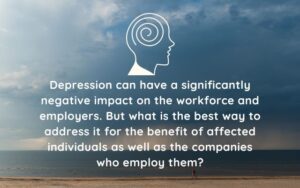Depression is a serious and widespread public health problem in South Africa. This mental health disorder costs the lives of people through suicide, having a hugely detrimental effect on those left behind. It negatively impacts the quality of life of millions and it is a burden to SA’s economy.
90% of depressed patients can be successfully treated, but unfortunately, many South Africans have no access to quality mental health care.
Motivating for more resources to be applied to mental health in South Africa will require a proper assessment of the severity of the problem. Motivating for the assessment is unlikely to happen. This leaves SA with a problem that is only going to increase. So much of SA’s problem is driven by addiction and mental health disorders. South Africa has extensive problems that contribute, here are some below:
6.5 million living with the effects of FASD (Fetal Alcohol Syndrome)
7.5 million living with HIV
GBV (gender-based violence) is 5 times the world norm.
A third of children in Gauteng suffer from stunted growth (read: malnourished!).
Drug and alcohol abuse is twice the world norm.
55,000 children living in child-headed households
Interpol named SA the “rape capital of the world”.
Depression in South Africa: The facts
Here are 10 facts about depression in South Africa.
- The lifetime prevalence of depression in SA is 9.7% or 4.5 million people.
- Women are two times more likely to suffer from depression than men.
- About 20% of South Africans will experience a depressive disorder at least once in their lifetime.
- There are 23 known suicides per day (which equates to 11% of all non-natural deaths). There are roughly 8000 deaths by suicide each year.
- For every person who dies by suicide, 10 attempt it.
- An estimated 12% of South African university students experience moderate to severe symptoms of depression.
- In rural communities, the prevalence of depression can be as high as 27%.
- Studies conducted in an urban setting estimate that one in four people in urban areas are depressed.
- In a peri-urban settlement in Cape Town the prevalence rate for post-natal depression was found to be roughly 35%.
- Depression in South Africa costs the country’s economy more than R218 billion in lost productivity annually.
Depression and Suicide
Mental health, crucial for overall well-being, has gained increased recognition in public and medical circles, yet suicide remains a major public health issue. Effective suicide prevention requires a multifaceted approach, including robust mental health support systems, early intervention, and accessible care. Understanding the various biological, environmental, and social factors that influence mental health is key, as is raising awareness about mental health signs and providing a network of professional and community support to aid those at risk of self-harm or suicide.
Suicide prevention involves society’s collective efforts, emphasizing open conversations and reducing stigma around mental health. Mental health disorders like depression, anxiety, and bipolar disorder are common and can significantly impair daily functioning. Substance abuse is closely linked with mental health issues, exacerbating existing conditions and potentially triggering new ones. Suicide prevention strategies focus on timely identification of risk factors and applying evidence-based treatments, with early intervention being critical. Comprehensive assessment, engagement with at-risk individuals, and creating safety plans are part of this approach, alongside therapies like CBT and medication. It’s vital to maintain accessible resources and support networks, recognizing the profound impact suicide has on communities and the importance of improving mental health awareness.
Teen Depression
Suicide is the second leading cause of death among youths aged 10-24, often linked to depression or other diagnosable mental or substance abuse disorders. Early treatment of depression is crucial to prevent mental health crises.
If a child shows depression symptoms consistently for two weeks, they should be evaluated. Key risk factors for suicide in children and teens include family history of depression or suicide, psychological disorders, previous suicide attempts, access to firearms, stressful life events, medical conditions, sexual identity issues, and a history of abuse or severe bullying.
Symptoms of depression in children and teens can differ from adults and may include persistent sadness, hopelessness, loss of interest in activities, withdrawal, low self-esteem, irritability, physical complaints, poor school performance, and changes in eating or sleeping patterns.
Suicidal signs may include giving away possessions, talking about suicide, expressing feelings of worthlessness, and sudden changes in behavior. Protective factors against suicide include community connections, family support, spiritual beliefs, access to care, problem-solving skills, and healthy lifestyles.
Preventative actions include being aware of suicide risk, discussing the issue openly, informing caregivers and school faculty, securing potential means of self-harm, and seeking professional treatment. In cases of crisis, immediate help should be sought at a pediatric emergency room.
Supporting a teen through depression involves listening, encouraging physical and social activity, staying involved in their treatment, and educating oneself about depression. It’s also important for parents to take care of their own needs, seek support, communicate openly with the family, and ensure that the needs of other children in the family are addressed.

Depression is a serious issue that can affect any employee, regardless of their job title…

We all know what sadness feels like. It’s a normal, human emotion, the ache after…

“Setting boundaries is a way of caring for myself. It doesn’t make me mean, selfish,…


